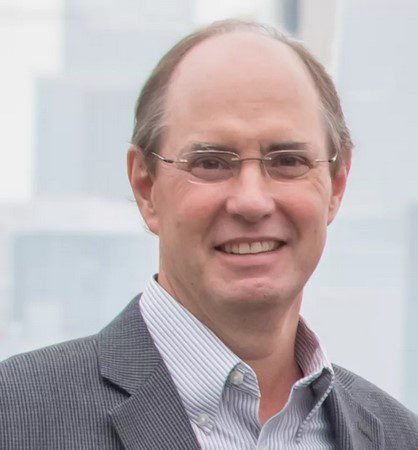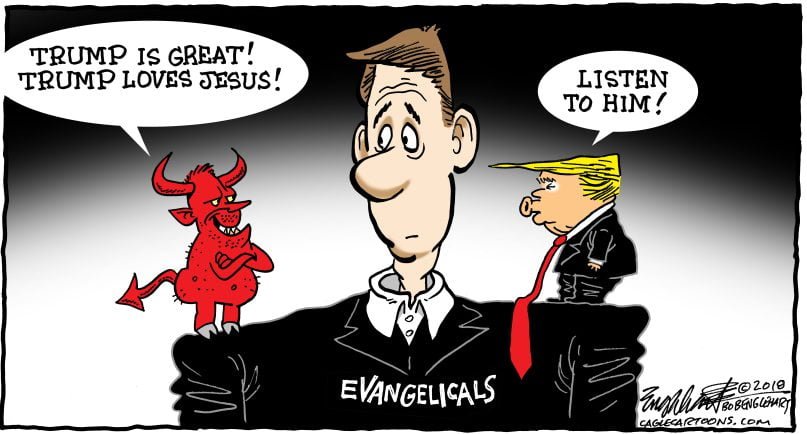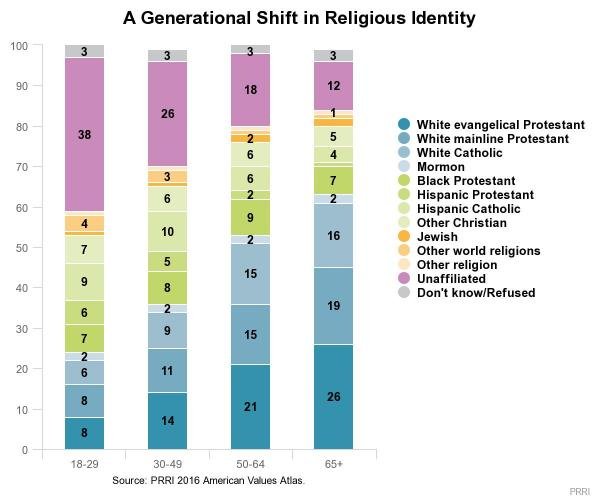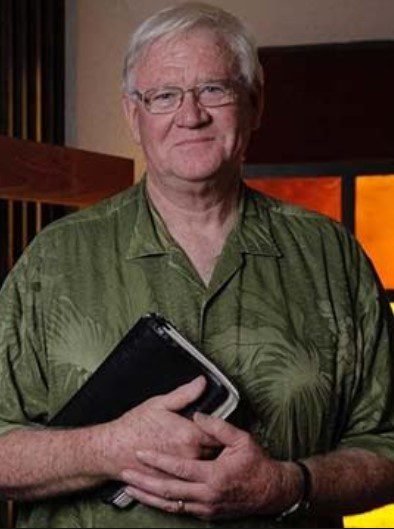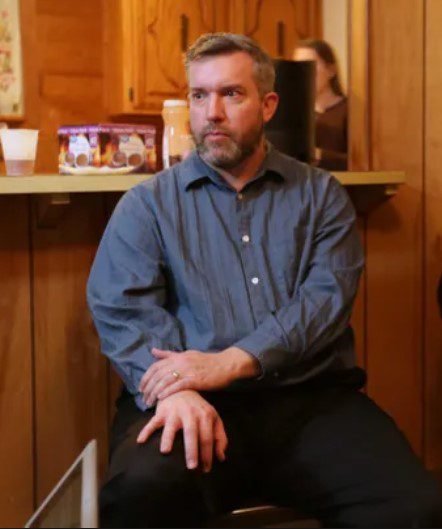
From the middle of the 20th century onward, religious sentiments in the United States shifted again. While Marxist atheism [Look, Bub, Marxism and atheism are not the same thing. You are deliberately lying to suggest otherwise. Surely, you are aware of the fact that there are Marxist Catholics?] took a strong hold in Europe, Russia and Eastern Asia, the West saw a modest incline in the number of atheists as well. Here in the United States, the number of Atheists went from about 0.5% to a whopping 3%, which is hardly noticeable really. That number has remained nearly unchanged in 30 years, fluctuating between 2% and 4% depending on who’s doing the survey. The average is 3%. [ That’s almost 10 million people, Bub.] That’s hardly a number any of us should worry about, but what atheists lack in numbers they make up for in noise. They like to flood Internet blogs, forums and chat rooms with their comments. They mock Christians and their beliefs. [No, most atheists mock Christian beliefs, not Christian people.] They file lawsuits against municipal, county and state governments for religious symbols on public property. They have a legal stranglehold on the public school systems. (All of these are Marxist tactics by the way.) For such a small percentage of the population, they absolutely demand to be heard, and they have no problem using everything at their disposal to make sure they are.[ Yes, we use things such as the U.S. Constitution and the Bill of Rights.]
Modern atheists like to point to recent declines in church affiliation as a triumph of atheism in American society. Indeed, the very word “atheist” is bantered around casually by young people these days, who have no religious affiliation whatsoever, and obviously don’t understand what the word really means. These are referred to as the “nones” because they answer “none” to the question of religious affiliation in surveys. However, when you really dig down into what these people actually believe, you’ll find out that they do believe in “a God” of some type, but they just don’t think it’s the God of Christianity or the Bible.
Yes, you read that right. The majority of “nones” today, who casually banter the word “atheist” in reference to themselves, will admit that they do believe in “a God” of some kind. If you ask them if this is the God who created nature and the universe, they will almost universally say “yes.” If you ask if characteristics of this God can be known by human reason or science, again they will almost universally say “yes.” I submit to you that what we are witnessing unfold in the United States right now is not the triumph of atheism, but rather a return to colonial-style Deism. It shouldn’t surprise us really. Americans have been down this road before. A large number of English colonists in America were Deist in the 18th century, and this century was sandwiched between two devoutly Protestant era’s [sic] in the 17th and 19th centuries. In abandoning Christian churches, Americans are simply going back to what they know as familiar to them — Deism. [Mr. Complete Christianity might want to talk to a few more NONES — especially Millennials — before coming to such ill-informed, asinine conclusions. NONES don’t give a shit about religion, period. Sure, they might think there is some sort of universal or divine energy, but Deism? Not a chance.]
….
If we’re going to re-evangelize the West, we have to understand who our primary target audience is. The “nones” are overwhelmingly Deists not atheists. [Wrong, but continue.] We don’t need to spend a whole lot of time arguing for the existence of God. Most “nones” already believe a God exists. Wrong, but continue.]They just don’t believe he’s the God of the Bible. Too many Christians spend way too much time trying to prove God exists with arguments about “First Cause” and “Pascal’s Wager,” which are all good arguments by the way. There is a reason why, however, I’ve only dedicated one page of this blog to them. It’s because the atheist argument against the existence of God is irrelevant. There just aren’t enough of atheists to really matter. [Keep telling yourself that, Bub. How about in Europe, also known as the America of the future?] Atheists have their product and nobody’s buying it. [Really? In the last decade alone, the paid membership of the Freedom From Religion Foundation has doubled. By all means tell us how does that growth compare to the number of Catholics actually attending Mass on Sundays?] Just 3% of the market share, after hundreds of years in business, isn’t much to brag about. Rather, we Christians should be spending our time focusing on who God is, not on proving whether or not he exists.
In focusing our arguments on proving the existence of God, we are narrowing our outreach to just 3% of the population. This is a group of people who likely won’t listen to us anyway. [Finally, you stopped talking out of your ass. Atheists aren’t listening because we find Christian arguments and evidence unpersuasive. Want to “reach” us? Change your schtick.] Marxist atheism, built entirely on coercion, is dying around the world [Of course, Catholicism is known as a “friendly” religion that never coerced anyone into believing, right? Talk about a huge disconnect from historical reality.] Western atheism is nearly irrelevant [Yet, you continue to rage against atheism. Why is that?] and always has been. Very few people in this group will ever listen to us. Don’t waste your time with them. Move on to more fertile ground. [And all Loki’s people said, AMEN!]
Most “nones” are Deists [Liar, liar, pants on fire. Stop making shit up, Bub.], so that means they believe in some kind of God, and most will tell you it’s the God of Nature, or the Creator God. Beyond that they won’t say who “he” or “she” is, or even if gender can be properly assigned to this Creator God. When I encounter a “none” who calls himself an “atheist,” I’ll usually ask: “So do you really believe there is absolutely no God at all, whatsoever? Or are you more inclined to say there probably is a God of nature, just not the God of the Bible or organized religion?” Almost always, at least 9 times out of 10, the “none” will respond by choosing the latter. At this point I’ll inform him that he’s not really an atheist then, because atheists don’t believe in a God. [Bub, you don’t even know how to define the words atheism/atheist.] Rather, he’s a Deist, and he’s in good company with many of America’s founding fathers, and a good number of famous scientists. You would be surprised to learn how many of these people readily accept being called a Deist, but will admit they’ve never heard the word before. [By all means, share the stories of people you have converted from “atheism” to “Deism.”]
— Shane Schaetzel, Complete Christianity, America’s Religion of Deism, May 26, 2019


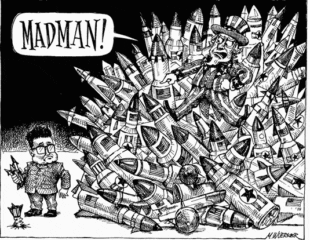 “Over these last few years, given the wars it has waged and the international treaties it has arbitrarily reneged on, the U.S. government perfectly fits its own definition of a rogue state.” —
“Over these last few years, given the wars it has waged and the international treaties it has arbitrarily reneged on, the U.S. government perfectly fits its own definition of a rogue state.” — 
